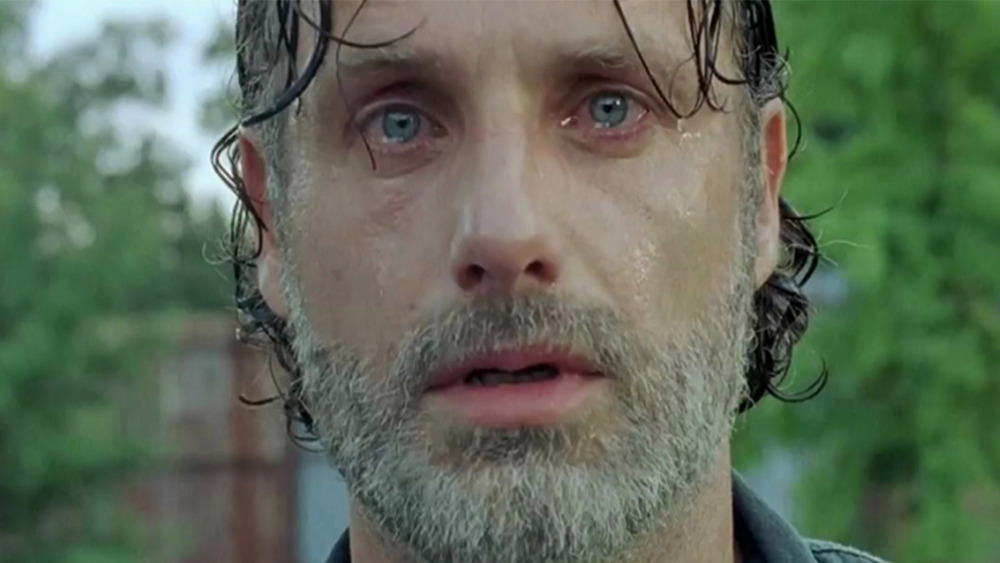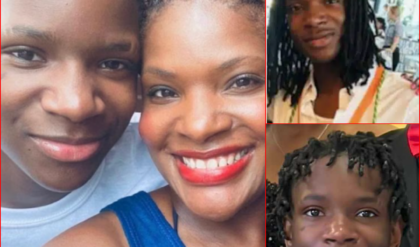
It’s no secret that AMC’s The Walking Dead has many passionate fans. How else could it have stayed on the air for more than 10 years, after all? Still, as the cast and crew of any show as wildly popular as this one know, an avid fan base can be both an extraordinary blessing and a bit of a curse.
Throughout The Walking Dead’s impressively long tenure, there have been plenty of controversial episodes, plots, and even special effects that have angered fans and caused impassioned outcries. Above all else, the most reliable source of fan outrage has been killing off beloved characters. While nearly every death on the show takes its own emotional toll, certain deaths spur upset on a grander and more intense scale. Fans had particularly difficult times saying goodbye to Glenn Rhee (Steven Yeun), Carl (Chandler Riggs), and Tara (Alanna Masterson) when their lives were cut short. While it wouldn’t be The Walking Dead without a whole lot of shocking violence, given the universe’s harrowing and dangerous world, fans criticize what they see as unnecessary and dramatically unjustified deaths, and also the way certain deaths are portrayed on screen. The Walking Dead’s fans have also taken writers to task for plot holes and story developments they don’t think make sense, as well as things like bad CGI.
With all that in mind, here are 10 of the most controversial moments on The Walking Dead that sent fans into spirals of outrage.
Glenn’s fake death, AKA dumpstergate
Season six of The Walking Dead is chock-full of moments that made its loyal fans irate. But few episodes outraged fans more than “Thank You,” the season’s third episode. Towards the end of the installment, fan-favorite character Glenn Rhee (Steven Yeun) finds himself trapped in an alleyway with Nicholas (Michael Traynor) with a horde of walkers headed their way. The two men climb onto a dumpster to avoid the ravening dead. Rather than attempt to fight the walkers off, however, Nicholas opts to end his own life, and ends up pulling Glenn down with him into the mass of walkers beside the dumpster. When the camera zooms to capture the crowd, viewers see a body being torn apart, but are unable to confirm whether the body belongs to Glenn or Nicholas.
Many viewers watched “Thank You” and assumed Glenn was a goner. However, some fans correctly predicted Glenn’s supposed death was a fake-out. In the end, writers made fans wait three more episodes to reveal that Glenn made it out by hiding underneath the dumpster.
Fans were not only angered by being forced to wait several episodes to learn that Glenn was alive, they were also irked by the improbability of him surviving such an event. Since the walkers often infect humans by biting exposed flesh, it makes little sense that Glenn could have crawled to safety without getting bitten, with little more than a t-shirt for protection.
Season six’s giant cliffhanger episode
Season six’s season finale, “Last Day on Earth,” quickly became one of the most talked-about episodes of The Walking Dead – and not for good reasons. Previous episodes see our heroes endure escalating conflict with another sect of survivors called the Saviors. In the last few minutes of “Last Day on Earth,” Jeffrey Dean Morgan is finally introduced as Negan, the group’s leader. Negan captures Rick, Michonne, Glenn, Maggie, and others, and brutally kills one of the group with his baseball bat. This climactic scene is filmed from the point of view of the victim, however, so it isn’t apparent to viewers who has died.
“Last Day on Earth” was savaged by critics for its uneven pacing and what many see as an overly dramatic ending. Some outlets like Vox even called the episode “dirt-stupid” and declared it “the worst episode the show has ever done.” The episode was not only criticized by professional pundits: Avid fans and viewers also voiced their disdain for the frustrating episode.
The backlash was so bad that showrunner Scott M. Gimple had to speak to reporters. He attempted to assuage fan anger and assure them that The Walking Dead had a solid story ready to go for the seventh season. The anticipation built in the months between “Last Day on Earth” and the reveal would be worth it, he argued. Whether or not fans have ended up agreeing is another story.
Glenn’s gut-wrenching death
When viewers tuned into season seven’s premiere episode, “The Day Will Come When You Won’t Be,” they were hanging on the furthest edge of their seats, eager to see who Negan killed at the end of the controversial sixth season finale. Unfortunately for The Walking Dead’s showrunner and writers, however, “The Day Will Come” created just as much backlash among viewers and fans as its much-debated predecessor. The episode starts by revealing that Negan killed Abraham with his baseball bat at the end of “Last Day on Earth,” as Rick and the rest of his friends watched in abject horror. In response, Daryl punches Negan. Negan punishes the group for this rebellion by brutally killing Glenn with the bat.
Not only was Glenn’s death criticized for playing up the gore and adding little to the series, it was also pointed out that his death via baseball bat eerily mirrors the murder of Vincent Chin. Chin was a Chinese-American man who was brutally beaten to death in Michigan in 1982.
Some critics were so incensed by this that they straight-up quit watching the show after “The Day Will Come When You Won’t Be” aired — as did many fans. To say that Glenn was a fan-favorite character would be a massive understatement, so his death would’ve caused outcry regardless of how it happened. But the exceptionally grotesque way it is portrayed proved to be simply too much for many Walking Dead watchers.
When the show’s Facebook page spoiled a huge character death
The Walking Dead’s earlier seasons aired in the super-heated beginning of our current “no-spoilers” era of television, where accidentally revealing an episode’s plot to a friend or coworker is considered a social crime of the highest degree. So, fans were unsurprisingly outraged when the events of “Coda,” season five’s mid-season finale, were spoiled. But the cat wasn’t let out of the bag by an overzealous critic or viewer. No — this time, The Walking Dead was spoiled by its own staff.
In this episode, Maggie’s sister Beth is killed mere moments before the two are supposed to reunite. To add further emotional injury, Daryl tragically carries Beth’s body just as Maggie gets to the hospital. AMC’s social media team posted a photo of this scene on The Walking Dead’s official Facebook page shortly after the episode aired on the East Coast, effectively spoiling the entire episode for everyone still waiting for it to air in different time zones. Had the leak been a little more ambiguous as to Beth’s fate, it might’ve been excused. But the photo used leaves little to the imagination … and is also captioned “RIP Beth.”
Fans were understandably upset, and the photo garnered thousands of angry comments, including calls for AMC to fire the social media manager who spoiled “Coda” for thousands of viewers.
The show’s pesky habit of burying its gays
By now, fans of The Walking Dead know that no character is ever fully safe in the show’s universe. It doesn’t mean the deaths of fan-favorite characters don’t hurt, however — and some deaths sting more than others. It can be especially painful to watch an LGBTQ+ character die, as there aren’t a whole lot of them on TV. When a work of media kills off LGBTQ+ characters excessively, it’s often referred to as “burying your gays.” The trope is not exclusive to The Walking Dead, but critics have identified the show as one of the trope’s worst offenders.
Denise’s (Merritt Wever) death in the middle of season six frustrated viewers for these reasons. The deaths of Tara (Alanna Masterson) and Jesus (Tom Payne) during season nine were the last straw for many. Defenders of The Walking Dead argue that the show introduced new LGBTQ+ characters that season, but critics counter that swapping out one set of LGBTQ+ characters for another is just as bad as simply killing them off.
These character deaths aren’t the only times that the Walking Dead’s portrayal of LGBTQ+ relationships has caused controversy, albeit for very different reasons. When Eric and Aaron shared the series’ first gay kiss back in season five, it was a win for LGBTQ+ representation on the show and TV. However, some viewers responded to the touching scene by angrily tweeting homophobic comments and slurs.
When the show revealed one of its most beloved characters had been bitten
As far as father-son duos go, Rick and Carl Grimes’ relationship has definitely been tested over the years. By season eight, the two are among only a handful of characters who have been on the show since its beginning. Fans watch Carl grow up, both literally and figuratively, over the course of the series: As he gets taller, he also goes from being a timid boy to a strong and empathetic young man.
Though fans of The Walking Dead know that no characters are completely off-limits when it comes to death, killing off Carl after developing his character so thoroughly seemed a bit far-fetched to many viewers. But that’s exactly what happens when Carl reveals that he’d been bitten by a walker in season eight’s mid-season finale. The circumstances of how Carl was bitten makes it all the more tragic: He was overwhelmed by walkers while selflessly saving Siddiq and bringing him to Alexandria.
Fans were enormously upset by the news that Carl had been bitten, and some tried frantically to come up with theories as to how Carl might possibly survive. Unfortunately, the show put those theories to rest: Carl ultimately chooses to take his own life and eliminate the risk of re-animation. The fans weren’t the only ones upset about Carl’s death either, as it happens — even the cast was distraught over this particular loss.
Fans roasted the show for its obviously fake CGI deer
Character deaths aren’t the only reason why The Walking Dead fans have critiqued the show over the years. While the bloody series is known for portraying hyper-realistic violence and eerily convincing zombies, there is one special effect that didn’t live up to audiences’ standards.
Season seven’s 12th episode, “Say Yes,” largely focuses on exploring the relationship between Rick and Michonne. While the two characters fend off walkers and search an abandoned fairground for food and supplies, Rick spots a live deer. Since Michonne had previously been forced to surrender a deer to the Saviors, Rick attempts to kill the deer for Michonne to settle their debt, but ends up falling into a horde of walkers after his high vantage point collapses.
This premise of Rick trying to square things with Michonne is reasonable enough. But the shots of the CGI deer that ended up in the show are so obviously fake that fans were flabbergasted as to how they made it into the final cut. To be fair, shooting a real deer would’ve been next to impossible in such an environment, since deer basically never stand still, but the CGI stand-in the show uses really is comically bad. If the showrunners were hoping the special effects in this episode would leave a lasting impression, they definitely did … just not in the way that they were probably hoping for.
Rick’s fake-out death
Despite the deaths that often come to beloved Walking Dead characters, it was, for a long time, generally understood that writers wouldn’t kill off the face of the series, Rick Grimes. That’s why viewers were shocked when AMC announced that season nine’s fifth episode, “What Comes After,” would be Grimes’ final episode of the show. Typically, people in The Walking Dead’s universe don’t just leave or move away: A final episode usually indicates that a character is about to die. So when Rick explodes a bridge to save the survivors from a horde of walkers, everyone assumed this sacrifice would be his last. After all, fans had been explicitly warned.
Alas, AMC wasn’t done with Rick Grimes just yet. He’s found alive at the end of the episode and taken by a mysterious helicopter that isn’t explained until the next season. Moreover, actor Andrew Lincoln was later announced to be starring as Rick in The Walking Dead films.
Understandably, some fans thought the fake-out was a cheap ploy for drama that saps the emotional weight of Rick’s sacrifice. Others thought the narrative device was fine the first time the show used it, but that it quickly grew stale from overuse. But the time Rick gets his own pseudo-death, the show had employed the manipulative trope far, far too many times before. At some point, fans just aren’t going to be shocked anymore.
When season 10’s finale was postponed
While fans have often been eager to voice their opinions about The Walking Dead’s writing and special effects, they’ve sometimes given the showrunners a hard time about conditions and elements that are simply out of anyone’s control. Case in point: The show’s 10th season began airing back in 2019, but post-production delays during the onset of the COVID-19 pandemic in spring 2020 meant that fans had to wait until early 2021 for season 10’s conclusion. Many viewers were upset about being forced to wait almost a full year to see the conclusion of so many storylines and character arcs. But most fans understood that this was a necessary measure AMC had to take to protect its staff.
Another point of contention for fans was that the unpredictable nature of the entertainment industry’s COVID-19 shutdowns made it impossible to predict when fans could expect to watch season 10’s final episodes. Season 10’s delays also meant that season 11 had to be pushed back, with the latter season gaining significantly more weight and importance once AMC announced it would be the show’s last.
Thankfully, the intended season 10 finale eventually aired in October, and AMC added six additional episodes to the run to placate long-suffering fans. Still, few viewers will forget how long they had to wait. It’s one of the more trivial frustrations of the COVID-19 crisis, granted, but it’s a frustration nonetheless.
When the main characters shifted alliances in the season eight finale
Few episodes were as divisive for The Walking Dead’s fan community as the season eight finale, “Wrath.” In the episode, the conflict between Rick’s alliance and Negan’s Saviors finally comes to a head, and Rick is able to overpower Negan in a dramatic showdown. Since Negan has caused so much pain and killed several members of Rick’s post-apocalyptic family, both viewers and survivors expected Rick to take retribution and kill Negan on the spot. However, Rick and Michonne decide to have mercy on Negan and take him as a prisoner. This causes Maggie to snap.
Blood-thirsty fans were with her. They felt as though they were robbed of a more satisfying ending to the war with the Saviors, while others felt that the complete 180 Rick takes to save Negan’s life after slashing his neck doesn’t make sense, even if Carl wanted him to live a more merciful life.
The episode clearly sets a new tone for season nine, and heavily insinuates that Maggie, Daryl, and Jesus will serve as antagonists to Rick and Michonne. While fans generally understood why Daryl and Maggie would find Rick’s mercy for Negan unacceptable (Negan gruesomely killed the father of Maggie’s child right in front of her, after all), some were confused as to why the more pacifist-minded Jesus sided with them.
RECOMMENDED
NEXT UP
TELEVISION
The Biggest Unanswered Questions In The Walking Dead
BY JEFF EWING and GABRAN GRAY/UPDATED: APRIL 15, 2022 5:37 PM EST
In the world of “The Walking Dead,” fans know they’re going to watch beloved characters evolve, go through hardships, and even die. Communities rise, fall, build alliances, wage war, and struggle to survive the fearsome zombie hordes that give the long-running hit series its name. Threats to major protagonists, like the once-mighty Saviors and Whisperers, have gone from major obstacles to chapters of the show’s past, all while the world of the franchise continues to evolve and grow as spinoffs reveal aspects and areas of “The Walking Dead” saga that fans have never seen before.
During all these years, numerous storylines, and countless changes, “The Walking Dead” probably couldn’t help but leave a host of important unanswered questions dangling along the way. With all that in mind, here’s a look at some of the major burning questions that the series has yet to answer.
Where has Rick been?
Paul Morigi/Getty Images
We last see a critically wounded Rick in Season 9, injuring himself in a heroic attempt to save his friends and loved ones from a massive herd of Walkers. What the other survivors don’t know is that Rick survives the heroic action (albeit barely) and is rescued by the mysterious Anne. Anne’s allies gather the pair into a helicopter to fly off to parts unknown, after which the show jumps forward years later — with no sign of Rick in the interim as far as the other protagonists are concerned.
In Season 10, Michonne discovers evidence on a grounded military boat that Rick may have survived the ordeal — among a host of scavenged goods, she finds his boots and cell phone, along with a log entry that suggests he may be alive and is potentially in New Jersey. She sets off to find him.
Now, we know a few things about the mysterious group who took Rick — the helicopter he left in belongs to the Civic Republic Military (or CRM), which will play a major role in the spinoffs “The Walking Dead: World Beyond” and the Rick-centric films that will continue his story. They’re an element of the Alliance of the Three, a network of three allied communities — the CRM is militaristic, advanced, and huge. So we know where Rick’s journey potentially takes him, but not exactly where it is, and we certainly have no idea what the intervening years have done for Rick’s circumstances or character.
What’s next for Michonne?
In the years since Rick’s disappearance and murky Season 9 fate, fan-favorite Michonne has become the leader of the Alexandria Safe Zone as well as the adoptive mother of Judith Grimes (and mother of R.J. Grimes). We last see her in the episode “What We Become” as she sets off north upon her discovery that Rick may be alive, determined to discover the fate of the man she still loves.
“What We Become” is confirmed to be the last appearance of the character on “The Walking Dead,” so we are unlikely to discover the answer within the show as it wraps up its final arcs. This is obviously an unhappy end for fans of the series, as Michonne is a pivotal and well-loved character. So… what will become of her?
Despite the character’s absence from the rest of the series, Michonne is open to returning in the Rick-centric films, so fans can expect a resolution to her romance with Rick and whatever else ultimately happens to the character. It will certainly be tied to Rick and the Civic Republic Military (whose helicopters took him away), but as those elements are also up in the air, Michonne’s fate can’t help but remain mysterious in the interim.
Who’s really running the Commonwealth?
Since Eugene, Ezekiel, Yumiko, and Princess made first contact with the Commonwealth, everyone within the Virginia communities has had their chance to be introduced. For the first time since the apocalypse began, there’s a place to live that truly looks like the world before the walkers. As more and more characters relocate to the Commonwealth, they begin to discover that not everything is what it seems and that the Commonwealth may not be as carefully organized as it appears at first glance.
Pamela Milton is governor of the Commonwealth, and in theory, she has the final say on everything that happens within the community’s borders. Milton clearly has her own agenda, one that involves allowing herself and her son to live as wealthy socialites, just like they did before the apocalypse. However, her plans aren’t the only ones affecting this new society.
Lance Hornsby is Milton’s deputy governor, and he has ambitions of expanding the Commonwealth and increasing his power. The average Commonwealth citizen, however, seems to look up to and respect security chief Michael Mercer more than the politicians that run the community. The balance of power between Milton, Hornsby, and Mercer seems to be in flux, and who will come out on top is one of the biggest lingering questions in the show.
What is the relationship between the Commonwealth and the Civic Republic?
Two major series events — Rick’s Season 9 departure and Eugene’s Season 10 capture — set us up for two major new civilizations in the world of “The Walking Dead” in the Commonwealth and the Civic Republic. What does the existence of these groups mean for the future of the show, and what is their relationship to each other?
The Civic Republic, which will be shown in more detail in “The Walking Dead: World Beyond” and the Rick Grimes spinoff films, is an advanced authoritarian society and part of the Alliance of the Three, an allied network of fortified cities including Omaha, Nebraska; Portland, Oregon; and the Civic Republic itself, which is geographically around Pennsylvania. It boasts 200,000 citizens and stands as the largest civilization in the show world to date.
The Commonwealth is an Ohio-based network of communities with around 50,000 citizens and its own well-organized standing army. It’s a central civilization in the comics, and as such there’s much more available information on it. It’s a thoroughly hierarchical class system, running in practice like a feudal monarchy where people are locked into the jobs they had before the apocalypse.
While the two organizations are distinct and should have strong roles in the future of the show, we don’t know what their relationships to each other are. As two of the largest civilizations we’ve seen so far, each with strong hierarchies and large, technologically advanced militaries, they’re certain to know of each other and have likely interacted. At the same time, the Commonwealth of the comics isn’t a member of the Alliance of the Three, so they’re also surely not allied. The future of the show and its world may lie in the relationships between these societies — we just don’t know yet what they are.
How will Daryl react to news that Rick is likely alive?
Mark Sagliocco/Getty Images
Following Rick’s disappearance (and the subsequent mistaken belief that he’s dead), it’s unclear how the other members of his group will learn of — and react to — the news that Rick is potentially alive after all this time. Michonne has informed Judith that Rick may indeed be alive, and she set off to find him with Judith’s blessing. We know that Judith has since told Daryl that Michonne isn’t coming back, telling him that she left to help some people she’d met — yet omitting the most important part.
She tearfully informs Daryl that she didn’t want to tell him anything about Michonne’s departure for fear that he’d leave, too, so it stands to reason that’s why she omits the real motive for Michonne’s exit. Daryl and Rick have such a long friendship that it’s unlikely he’d react any differently than Michonne. He’s nearly certain to find out eventually — it’s just unclear how.
How will Daryl respond to the discovery that his longtime friend may be alive? While he’ll be undoubtedly shocked, will he be heartbroken? Confused? Angry? Will he leave? And how long will it take him to figure out where to look? There’s a big reveal in Daryl’s future. How it will occur, and how he’ll react, are anything but certain.
Can Virgil be trusted?
Virgil, first introduced in Season 10, is still a very mysterious character. We first encounter him as a researcher in the capture of Oceanside, one who promises Michonne a weapon that will help against the Whisperers. Virgil accompanies Michonne on the excursion that marks her major discovery of Rick’s survival (and subsequent departure from the show). He betrays her, trapping and drugging her — a prelude to the discovery that he’s also been keeping his coworkers captive for quite some time. She overpowers him, and when Michonne discovers Rick may be alive, she lets Virgil live and sets off on her journey.
He later returns to Oceanside to find it empty, and we see a horse-mounted Virgil pick up a desperate Connie. Here’s where things get both dicey and mysterious. When Michonne leaves Virgil, she seems to see some good in him despite his treachery and a history of having done some bad things. Is he trustworthy? If not, Connie is certainly in jeopardy. Her fate, and the response of Daryl and others, remains mysterious.
Negan’s free. What will Maggie do?
Negan has been on a journey of redemption ever since he was beaten by Rick at the end of Season 8. After keeping him locked in a jail cell for years, the community finally frees Negan when they need his help to survive. He’s been a useful member of the group ever since, but Maggie’s return to Alexandria at the end of Season 10 seems poised to change that. The early episodes of Season 11 explore the tension between Maggie’s desire for revenge and Negan’s reformed way of living.
Now Maggie has found herself relying on Negan’s assistance more than once. At first, theirs was a begrudging partnership, but now there’s genuine trust developing between them. Negan saved Hershel’s life in “The Rotten Core,” and Maggie comes to him for help again when the Commonwealth Army makes a move on Hilltop. For now, the two have an uneasy partnership, but Maggie certainly hasn’t forgotten what Negan did to Glenn years ago. Complicating matters further, now Hershel knows that Negan is the one who killed his father. He may be young, but Hershel shows a willingness to settle matters on his own when he pulls a gun on Negan in Episode 14. It’s anyone’s guess how the three of them will resolve their differences.
What are the Miltons hiding?
AMC
The Commonwealth is far from perfect, and many of its biggest problems seem to be directly tied to Pamela Milton and her son Sebastian. The governor’s son wears his corruption on his sleeve. Sebastian has repeatedly shown that he believes he’s above the laws and rules that other Commonwealth citizens must follow. When he’s cut off from his mother’s money, Sebastian sends Daryl and Rosita into a walker-infested house to steal cash that can support his “lifestyle.” Clearly, he’s up to some shady business, but the extent of his wrongdoings is still mostly unknown.
Pamela, on the other hand, keeps her cards close to her chest. She may or may not know what Sebastian gets up to in her free time, but one thing is clear: she’s more concerned with preserving her way of life than with providing for the people of the Commonwealth. From uneven resource distribution to the mysterious disappearance of dozens of citizens, there’s clearly something strange happening in the Commonwealth, and the Miltons are at the center of it. Now that Eugene and his friends are investigating the family, it’s only a matter of time until the truth comes to light.
Is the Commonwealth a force for good?
AMC
Most of the characters in “The Walking Dead” have an uneasy relationship with the Commonwealth. Many are grateful for the opportunity to start a new life in a bustling and relatively stable community. Others are deeply concerned about the inequities that are baked into the Commonwealth’s social structure. It seems like both the good and the bad of the old world have been preserved in this post-apocalyptic community.
Of course, any place that’s home to over 50,000 people can’t just be one thing, but whether or not the Commonwealth is primarily a force for good is an essential question for our favorite characters to answer. In the Season 11 episode “Warlords,” Maggie says she’s concerned the Commonwealth’s citizens haven’t been tested by the world, much like how the people of Alexandria weren’t tested before Rick’s group arrived. That would certainly be a problem, but it’s one that Maggie and her friends already know how to deal with.
Unfortunately, the Commonwealth also resembles another group we’ve seen before — the Saviors. The Commonwealth has a rigid social hierarchy, sucks up guns and other resources, and, under Lance Hornsby’s leadership, seems intent on absorbing other communities. Its very size makes the Commonwealth one of the most imposing threats in the show’s history. Is it a misguided community or the beginning of a corrupt empire? Only time will tell.
What will the Commonwealth do with the communities?
AMC
The midseason finale of Season 11 sees Hilltop, Alexandria, and Oceanside all being absorbed by the Commonwealth under the direction of Lance Hornsby. It likely won’t be long until the Alexandrians and Hilltoppers currently living in the Commonwealth find out that their old homes have been annexed. Many of them are satisfied with their new lives in a safe and prosperous community, but how will they react when they realize that the Commonwealth is opposed to the freedom of other communities?
There’s a good chance that the Commonwealth will treat its new acquisitions fairly. After all, it’s already given time, manpower, and resources to the Alexandria rebuild. Perhaps the Commonwealth could help restore Hilltop to its former glory and guarantee safety to the people of Oceanside.
On the other hand, we’ve seen the communities overtaken by an outside force, and that didn’t go well for anyone. Hornsby says he wants to “remake the world,” but the Saviors also believed they were doing what was right for the whole of humanity. “Act of God” ended with Hornsby ominously flipping a coin in front of a group of Oceanside prisoners. What is he deciding in that moment? Will he subjugate his new citizens and steal their resources, or is he truly committed to providing for all people? Whatever the answer, there’s plenty of conflict ahead for everyone involved.





